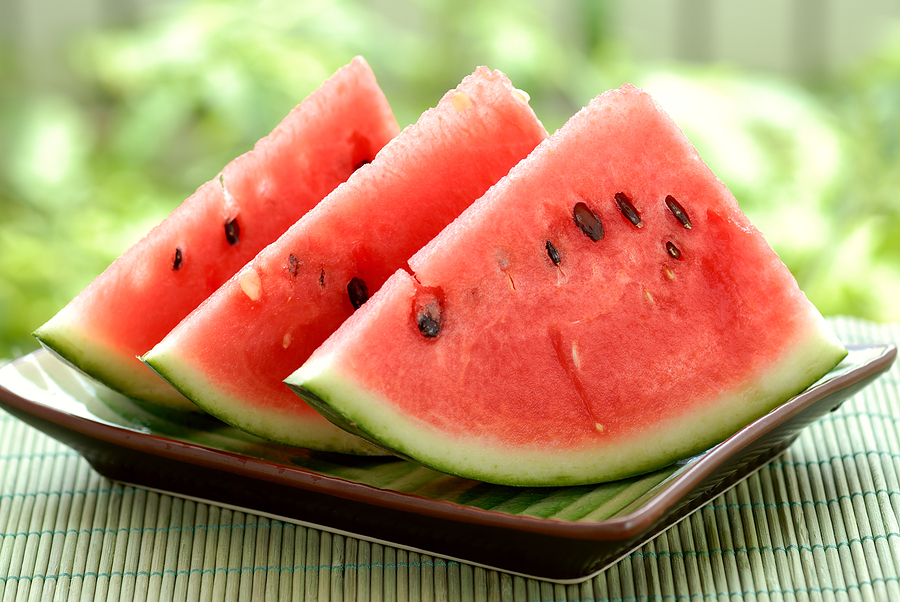Watermelon is a native of Southern Africa and moved north to Egypt and later, about 1000 years ago, to China. Now, of course, watermelon is grown all over the world and these days, is cultivated to grow bigger and sweeter.

It is a popular myth, that Watermelon comprises water and sugar and that apart from the water, offers no benefits at all. Well, this could not be further from the truth! It is actually a nutrient dense food, and one that provides a high amount of Vitamins, antioxidants and minerals – and all for a surprisingly low count of calories.
High Blood Pressure
Watermelon is a high Lycopene food – like Tomatoes – being a carotenoid phytonutrient – which is particularly important for our cardiovascular (blood, veins, arteries and the heart) health – including improvement of blood flow to all parts of the body and thereby decreasing the pressure (blood pressure) needed to pump it around the system. There is also increasing evidence, that it prevents the accumulation of fat in fat cells.
Cancer
Watermelon is wonderful source of the powerful antioxidant Vitamin C – as well as a number of others (like, Vitamin E, Glutathione (GSH)) and Alpha-Lipoic-Acid (ALA)) which can assist in combatting the formation of known free-radicals that cause cancer. The intake of Lycopene (see High Blood Pressure above) has been linked to a decreased risk of Prostate Cancer (the Prostate Gland is only found in men) in a number of health studies. Other significant reductions have been seen in, breast, lung, colon and endometrial (the tissue lining the inner cavity of the uterus – or womb) cancers.
Diabetes
Diabetic patients often complain of feeling half-fed due to their low energy and low sugar diet. Step up the humble watermelon which, despite being sweet to taste a nice thick wedge will only provide relatively few calories due to the fact, which is composed of 99% water and roughage. But, the many vitamins and minerals, viz potassium and magnesium assist in the proper functioning of insulin in the body, thereby lowering the blood sugar level. Also, Arginine – another compound found in watermelons – is truly effective in enhancing the effectiveness of insulin on blood sugar levels.
Macular Degeneration
Reduce your concerns about eye health and macular degeneration by eating plenty of watermelon. This is due to its content of beta carotene, lutein, zeaxanthin and vitamin C, meaning that your eyes are well protected. These will ensure good protection of your eyes from age-related blindness and degeneration, and more, these antioxidants will aid the protection of your eyes from other age-related ailments such as, drying up of eyes and optical nerves – as well as glaucoma.
Asthma
It is known, that the risks for developing asthma are lower in those who consume high amounts of particular nutrients. One of these being vitamin C, found in many fruits and vegetables – including watermelon.
Inflammation
Watermelon contains Choline, an extremely important nutrient that aids our bodies in sleep, muscle movement and also learning and memory. Choline also very useful in maintaining the integrity of cellular membranes, assists in the transmission of nerve impulses and the absorption of fat and reduces chronic inflammation.
Skin and Hair
Watermelon is also a bonus for your skin because it contains vitamin A, a nutrient that’s necessary for the production of sebum, which helps to keep hair moisturized.
Making sure you have enough vitamin C is also necessary for the building and maintenance of collagen, thereby providing structure to skin and hair. Watermelon also assists in overall hydration, something that is vital for healthy looking skin and hair.
Impotence
Arginine, which is also present in watermelon, is beneficial in curing erectile dysfunction, and further, the stimulating nature of this can lift libido, trim frigidity and provide a boost to your love life. So, why not enjoy a few slices of watermelon together!
Conclusion
Well, a host of benefits, I think that you will agree! Far from being inconsequential, watermelon could be thought more as a belle of the ball! Let me give you a passing tip: if your teeth are strong enough, eat those seeds within the watermelon – don’t spit them out! Watermelon seeds are rich in beneficial fats and proteins and besides, the outer shell acts as a good item of roughage and as my lovely (late) mother-in-law (from Devon) used to say – ”It’s good for what’s wrong with you!”
